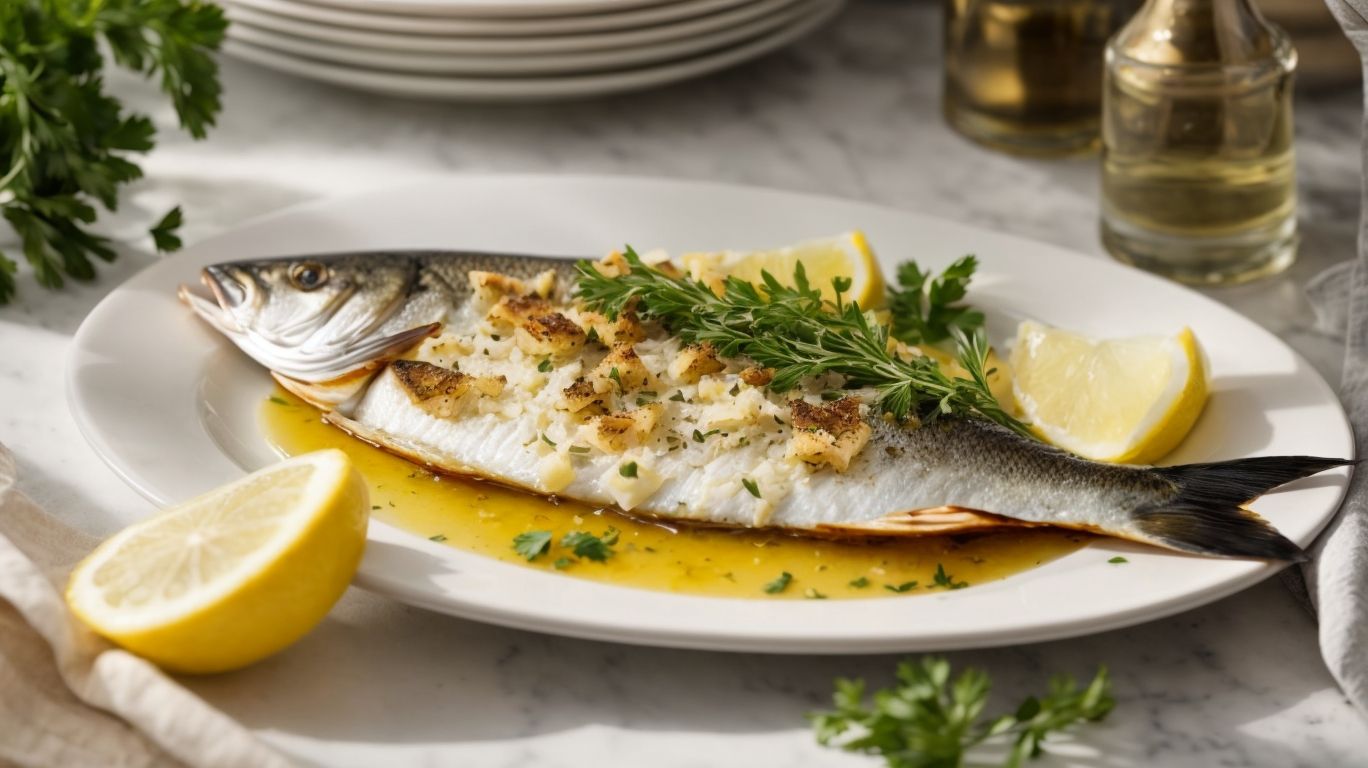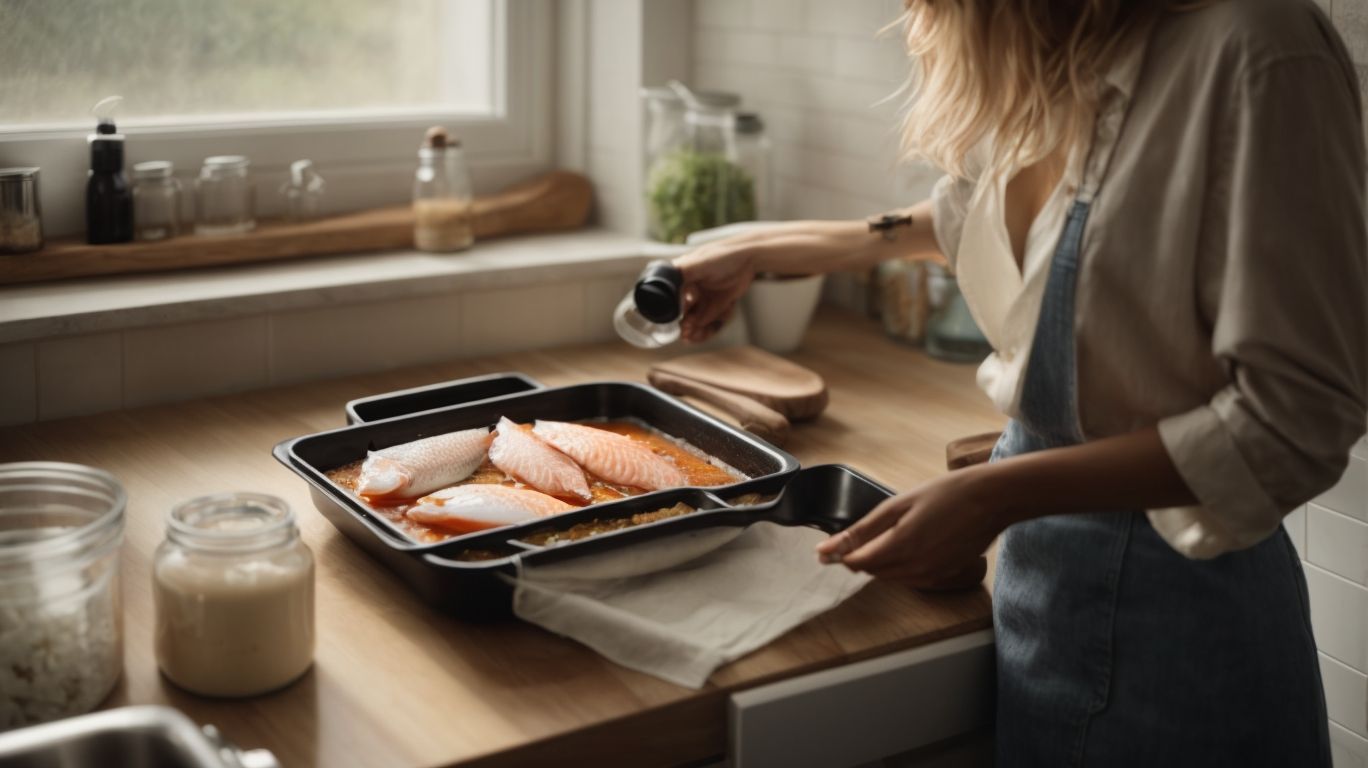How to Bake Fish Without Smelling Up the House?
Are you a seafood lover but can’t stand the lingering fishy smell in your house after baking fish? You’re not alone.
We explore why baking fish creates a strong odor and how you can reduce it. From choosing the right type of fish to using aromatics and herbs, we’ve got you covered.
Stay tuned for tips on baking fish without smelling up the house and enjoy a fresh, delicious meal without the unwanted odors.
Key Takeaways:
Why Does Baking Fish Create a Strong Odor?
Baking fish can often result in a strong odor that permeates the kitchen, leaving a distinct seafood stench that may linger longer than desired.
There are several factors that contribute to this potent smell when baking fish. The cooking method plays a crucial role; for example, low-and-slow baking tends to intensify the aroma as compared to quick high-heat cooking methods. When fish is baked slowly, compounds like trimethylamine oxide are released, which contribute significantly to the distinctive smell. The type of fish being cooked and its freshness can also impact the odor. Different seafood varieties have varying levels of natural oils and proteins, leading to unique scent profiles when cooked. These factors combined create the signature aroma that accompanies baking fish.
What Causes the Fishy Smell?
The fishy smell that arises when baking fish is primarily due to compounds like trimethylamine oxide and ammonia released during the cooking process.
Trimethylamine oxide, a chemical compound found in fish, starts to break down into trimethylamine when fish is cooked. This breakdown is accelerated at higher temperatures, leading to a stronger fishy odor. Different fish species contain varying levels of trimethylamine, influencing the intensity of the smell when baking. The presence of ammonia, another compound released during cooking, further enhances the distinctive aroma associated with fish dishes. The cooking method used can also impact how much of these compounds are released, contributing to the overall olfactory experience.
Why Does the Smell Linger?
The lingering nature of the fishy smell post-baking can be attributed to its absorption into kitchen surfaces and inadequate ventilation systems.
Kitchen surfaces, such as countertops, cabinets, and floors, are often porous, allowing the odors to seep deep into the material. This makes it challenging to simply wipe away the smell with a surface cleaner. Improving ventilation by using exhaust fans or opening windows can help in dissipating the odor quicker.
Regular deep cleaning with solutions like vinegar, baking soda, or lemon can help neutralize the odor. Placing bowls of vinegar or activated charcoal in the kitchen can absorb lingering smells.
For stubborn odors, consider using specialized odor-removing products or professional cleaning services. Creating a habit of keeping a clean kitchen and maintaining proper ventilation can significantly reduce the persistent fishy smell in your kitchen.
How to Reduce the Fishy Smell While Baking Fish?

Credits: Poormet.Com – Roger Nguyen
To diminish the fishy smell during the baking process, several strategies can be employed, ranging from selecting fresh fish to utilizing aromatic ingredients and cooking techniques.
In terms of choosing fresh seafood, always look for clear and bright eyes, firm flesh, and a clean, ocean-like smell. Fresh fish will significantly reduce any unpleasant odors during baking.
Marinating the fish in a mixture of citrus juices or vinegar before baking not only adds flavor but also helps neutralize any fishy smell. You can also experiment with a variety of herbs and spices like garlic, ginger, dill, or parsley to enhance the taste and mask the aroma.
Choose the Right Type of Fish
Selecting the appropriate type of fish is crucial in reducing strong odors while baking, with fresh seafood varieties being preferable for a more pleasant cooking experience.
In terms of fish selection for baking, opting for mild-flavored varieties like cod, haddock, or tilapia can help minimize any overpowering smells that can sometimes accompany seafood dishes. These types are not only known for their subtler aromas but also for their flaky texture that complements baking methods perfectly.
It’s essential to not only consider the aroma but also the sustainability of the seafood you choose. Look for sustainable seafood options that have been responsibly sourced to support marine ecosystems and ensure a future supply of fish.
Adjusting recipes to suit different fish varieties can enhance the flavors and textures of your dishes. Experiment with versatile cooking methods such as grilling, pan-searing, or poaching to bring out the best in each type of fish you select.
Freshness is Key
Ensuring the freshness of the fish before baking is essential not only for minimizing odors but also for maximizing health benefits and flavor quality.
In terms of seafood, freshness is key. Opting for fresh fish sourced from reputable suppliers or local markets ensures that you are getting the best quality product packed with essential nutrients such as Omega-3 fatty acids and high-quality proteins. Fresh seafood not only tastes better but also retains more of its nutritional value compared to frozen or preserved options.
When buying fish, look for clear, bright eyes, firm flesh, and a mild ocean-like smell. These are indicators of freshness. Avoid fish with cloudy eyes, soft or discolored flesh, or a strong fishy odor. Once you’ve selected your fish, proper storage is crucial to maintain its freshness. Store fish in the coldest part of your refrigerator, ideally in a sealed container over ice to keep it at optimal freshness until you’re ready to bake it.
Marinade or Season the Fish
Enhancing the flavor of fish with marinades or seasoning not only adds taste but also assists in masking any undesirable odors that may arise during baking.
In terms of creating a delicious marinade for your fish, consider combining zesty lemon with minced garlic and a selection of fresh herbs such as parsley, dill, or thyme. The citrusy brightness of the lemon will impart a refreshing tang, while the garlic adds depth and aroma. Herbs contribute a fragrant complexity that can transform a simple dish into a culinary delight.
For those seeking healthier alternatives, opt for olive oil as the base of your marinade. Olive oil not only imparts a rich flavor but also contains heart-healthy monounsaturated fats. You can further enhance the nutritional profile by incorporating anti-inflammatory ginger or turmeric, which also add a warm, earthy note to the marinade.
Use Aromatics and Herbs
Employing aromatic herbs and spices in fish dishes can infuse delightful flavors while counteracting any lingering fishy smells that baking may produce.
A key component in creating well-rounded baked fish dishes is the use of aromatic ingredients like garlic, lemon, and thyme. These not only add depth to the flavor profile but also bring a touch of freshness to the dish. In various cultures, the choice of herbs and spices can reflect local taste preferences and culinary traditions, such as the use of dill in Scandinavian cuisine or cilantro in Mexican recipes.
To enhance the overall appeal of baked fish, consider experimenting with complementary flavor pairings like rosemary and citrus for a zesty kick, or basil and tomato for a Mediterranean touch. By combining different herbs strategically, you can create complex layers of taste that elevate the dish from ordinary to extraordinary.
When preparing baked fish, try techniques such as en papillote (cooking in parchment) to seal in moisture and flavors, or herb-crusted coatings for a satisfying crunch. The gentle aroma of fresh herbs permeating through the tender fish can make each bite a sensory delight, pleasing both the palate and the nose.
Cook the Fish in a Foil Packet
Enclosing the fish in a foil packet while baking can help contain the aromas and juices, resulting in a more controlled cooking environment and reduced overall smell.
Cooking fish in a foil packet helps to lock in moisture, preventing the fish from drying out during the baking process. This method also allows the fish to cook evenly and gently, resulting in a tender and flavorful dish.
When preparing foil packets, it’s crucial to create a tight seal to ensure that steam and flavors are trapped inside. Folding the edges of the foil securely and leaving some room for expansion while cooking will help in producing perfectly cooked fish.
The cleanup process after baking fish in foil packets is incredibly easy, as there is minimal mess or residue left behind on baking sheets or pans.
Bake with Citrus
Incorporating citrus elements like lemon juice or zest in the baking process can impart refreshing flavors to the fish while helping to neutralize any unwanted fishy odors.
The acidity in citrus fruits such as oranges or limes can also help to tenderize the fish meat, making it more succulent and flavorful when cooked. When preparing a marinade, consider combining citrus with herbs like dill or parsley for a bright and aromatic blend that complements the fish without overpowering its delicate taste.
Citrus-infused salsa or relish can add a zesty touch to grilled fish dishes, enhancing their overall appeal and providing a burst of freshness with each bite. Experiment with different types of citrus, from grapefruit to tangerines, to discover unique flavor pairings that elevate your fish recipes to new heights.
Use a Ventilation System
Installing or utilizing a proper ventilation system in the kitchen can effectively disperse fish odors, preventing them from lingering and permeating the household.
A good ventilation system helps in removing excess heat, steam, and airborne particles generated during cooking, which can lead to a more comfortable and healthier indoor environment.
Improving air quality is crucial for maintaining a pleasant atmosphere in your kitchen and the rest of your home. Along with ventilation hoods, investing in high-quality air purifiers with HEPA filters can further aid in eliminating cooking odors and airborne contaminants.
Suppose you’re looking for cooking methods that produce fewer odors. In that case, you might consider using an air fryer or grilling outdoors to reduce the need for heavy ventilation while still enjoying delicious meals.
Tips for Baking Fish Without Smelling Up the House

Credits: Poormet.Com – Vincent Martin
To prevent the pervasive fish odor from permeating the house during baking, implementing specific tips and practices can help maintain a fresh and odor-free environment.
One effective way is to boil a pot of water with lemon slices or vinegar as the fish bakes; the citrusy or vinegar aroma will help neutralize the fish smell. Strategically placing containers of baking soda in the kitchen can absorb lingering odors. After baking, wipe down surfaces with a mixture of hot water and vinegar to clean and deodorize simultaneously. Consider investing in an air purifier with a HEPA filter to capture airborne particles, including odors, or explore alternative cooking methods like grilling or poaching that produce less potent smells.
Clean Up Properly
Proper cleanup after baking fish involves thorough cleaning of surfaces, utensils, and appliances using natural deodorizers like vinegar or citrus-based solutions to eliminate residual odors.
Post-baking cleanup plays a crucial role in managing fish odors, especially due to the lingering scent that can permeate your kitchen for hours. To maintain a fresh environment, it’s essential to tackle the odors effectively. Choosing eco-friendly cleaning agents is not only good for the environment but also ensures that the smells are neutralized rather than masked.
When cleaning your kitchen equipment after baking fish, start by soaking utensils in warm water and a mixture of vinegar and baking soda to break down grease and eliminate odors. For sinks and countertops, wipe them down with a solution of water, lemon juice, and baking soda to remove any lingering fishy smells.
Use an Air Purifier
Employing an air purifier can aid in removing lingering fish odors from the house post-baking, promoting a cleaner and healthier indoor air quality.
Aside from eliminating fish odors, air purifiers are highly effective in filtering out a multitude of other airborne contaminants. These devices can trap dust, pet dander, pollen, and even harmful chemicals that may be present in the air from cooking processes.
Utilizing an air purifier helps in improving air circulation, ensuring that the purified air reaches every corner of your living space. This constant circulation not only removes odors but also prevents the buildup of stale air, creating a fresh and inviting environment.
Try Alternative Cooking Methods
Exploring alternative cooking methods like grilling or poaching fish can offer flavorful outcomes with reduced odor concerns compared to traditional baking techniques.
Grilling fish not only imparts a smoky flavor but also helps in reducing the fishy smell that some find off-putting.
Poaching, on the other hand, involves gently simmering fish in flavorful liquid, resulting in a delicate and moist dish without the need for added fats.
Another modern technique gaining popularity is air-frying, which yields crispy textures without excessive oil, making it a healthier option.
Conclusion

Credits: Poormet.Com – Nicholas Campbell
Managing fish odors during baking involves a combination of smart cooking practices, proper ventilation, and cleaning routines to ensure a pleasant and aromatic culinary experience in the kitchen.
In terms of reducing fish odors, one of the primary keys is starting with fresh fish. Ensure that the fish you use is as fresh as possible, as older fish tends to release a stronger odor during cooking. Additionally, seasoning plays a crucial role in masking any unwanted smells. Consider using aromatic herbs like dill, parsley, or thyme to enhance the flavor while mitigating odors.
- The cooking techniques you employ can greatly impact the final result. Opting for methods such as en papillote (cooking in parchment paper) or grilling can help contain the odors and prevent them from spreading throughout your kitchen.
- To maintain a fresh kitchen environment, make sure to regularly clean your cooking surfaces, utensils, and any areas where fish may have come in contact. Using lemon or vinegar solutions can also help neutralize lingering smells.
Ultimately, finding the balance between enhancing flavors and controlling odors is key to enjoying delicious fish dishes without overwhelming your senses. Experimenting with different ingredients and techniques can help you discover your perfect combination for a delightful and odor-free cooking experience.
Frequently Asked Questions
What are some ways to bake fish without smelling up the house?
There are several ways to bake fish without creating a lingering odor in your home. Some options include using different cooking methods, seasoning the fish properly, and ensuring proper ventilation in your kitchen.
Why does fish typically have a strong smell when cooked?
Fish naturally has a strong odor due to the presence of trimethylamine oxide, which is released when the fish is killed. This odor can become even stronger when cooking methods like baking are used.
What types of fish are less likely to produce a strong odor when baked?
Generally, lean fish such as cod, tilapia, and haddock have a milder odor when cooked compared to fattier fish like salmon or tuna. White fish also tends to have a less intense smell in general.
How can I prevent the smell of fish from spreading throughout my house?
One way to prevent the smell of fish from permeating your home is to place a bowl of vinegar or lemon juice near the oven while baking. The acidity in these ingredients can help neutralize the fish odor.
What herbs and spices can I use to reduce the smell of fish when baking?
Herbs and spices with strong flavors, such as rosemary, thyme, garlic, and ginger, can help mask the smell of fish when used in the marinade or during cooking. You can also try adding a splash of citrus juice for a fresher scent.
Is there a specific temperature or cooking time that can help reduce the smell of baked fish?
Yes, cooking fish at a lower temperature and for a shorter amount of time can help reduce the smell. The high heat of the oven can cause the fish to release more odorous compounds, so baking at a lower temperature, such as 350°F, for about 15-20 minutes can help minimize the smell.

